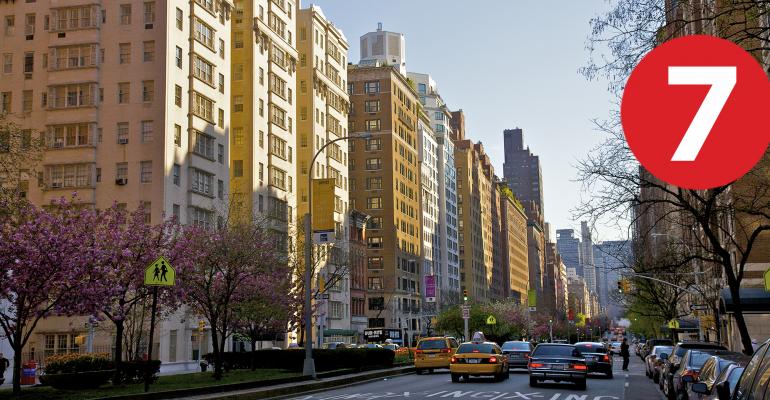- Manhattan Rents Were the Highest Ever for December “The average apartment rent in Manhattan hit $4,440 in December, while the more widely watched net effective median rent (median rent including all discounts) hit $3,392 — the highest level for December on record — according to a report from Douglas Elliman and Miller Samuel. The net effective median rent was up 21% over last year. The surge marks a dramatic turnaround from a year ago, when there were more than 25,000 empty apartments for rent in Manhattan and even the most bullish brokers predicted a years-long recovery.” (CNBC)
- Inflation Surge is On Many Executives’ List of 2022 Worries “In the hierarchy of business threats confronting corporate leaders in 2022, Covid-19 still rules. But inflation has quickly closed the gap. Concerns about rising prices skyrocketed in the past year, according to a survey of more than 900 global CEOs conducted by the Conference Board, a business research group. More than half of the CEOs expect price pressures to persist until at least mid-2023 after having registered as a low-level worry in the year-ago survey.” (The Wall Street Journal)
- Goldman Sachs Announces Fund for Black-Led Affordable Housing Developers “Goldman Sachs is taking steps to remove barriers to access to capital for black developers as part of its One Million Black Women initiative. The Urban Investment Group within Goldman Sachs Asset Management announced that it closed a $75 million investment with the National Affordable Housing Trust (NAHT) to establish the Black Developers Initiative Affordable Housing Fund, which will finance high-quality affordable housing across the country sponsored by Black-led developers.” (GlobeSt.com)
- What’s Getting This Commercial Real Estate CEO Down? “The shortage of skilled labor is ‘probably the biggest challenge businesses are facing today,’ according to Abraham Bergman (pictured), CEO and co-founder of Eastern Union. Bergman, who took over as company president last November, revealed that finding the right people to fill key job vacancies ‘has been tough’ as there ‘is not a lot of talent available.’” (Mortgage Professional America)
- Supermarkets Cut Hours, Services as Omicron Infects Workers “Across the country, supermarket workers are calling out sick after contracting Covid-19 or getting exposed to the virus, executives and employees said, prompting retailers to manage operations with fewer workers, while shopper demand for groceries remains high. Some grocers said they are hiring new employees, using temporary employment agencies and overscheduling available staffers to keep stores open, though some said they worry about continued pressure on their workers.” (The Wall Street Journal)
- Coverage Could Soon Be Impossible for Multifamily Real Estate Insureds to Secure “The multifamily real estate insurance market in the United States has hardened significantly over the past few years, resulting in major rate increases and restrictions in coverage terms and conditions. Three prevalent issues that are driving claim severity in the multifamily real estate space - and therefore influencing the hard market conditions - are: slips and falls resulting in serious injury or broken bones, swimming pool deaths and/or life-threatening incidents, and assault and battery.” (Insurance Business America)
- The Empty Promise of Instant Delivery “Despite the booming landscape of instant delivery apps, most have yet to yield sustainable returns for the investors pumping them with billions of dollars. As much as Amazon and couriers like DoorDash, Uber, and Gopuff are pushing to turn urban centers into fulfillment centers, complete with ghost kitchens and ghost brands, stores — and all the nuisances of in-person shopping — will still be around in some capacity. Shoppers still like sauntering through malls, no matter how tech-adjusted they are. Amazon might have won customers over with its blindingly fast delivery standards, but its business model is not free of logistical complexities. One-day shipping is expensive and dependent on a vast, underpaid workforce that smaller retailers can’t afford.” (Vox.com)
0 comments
Hide comments





